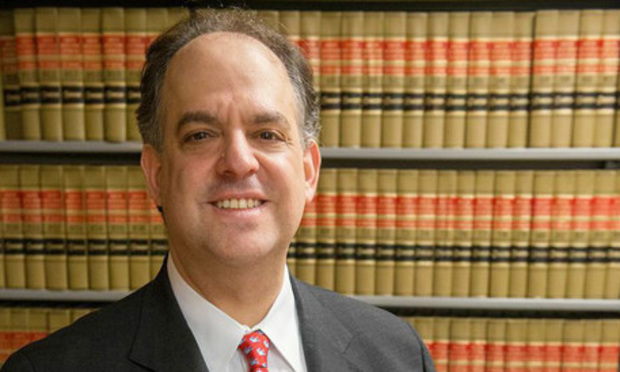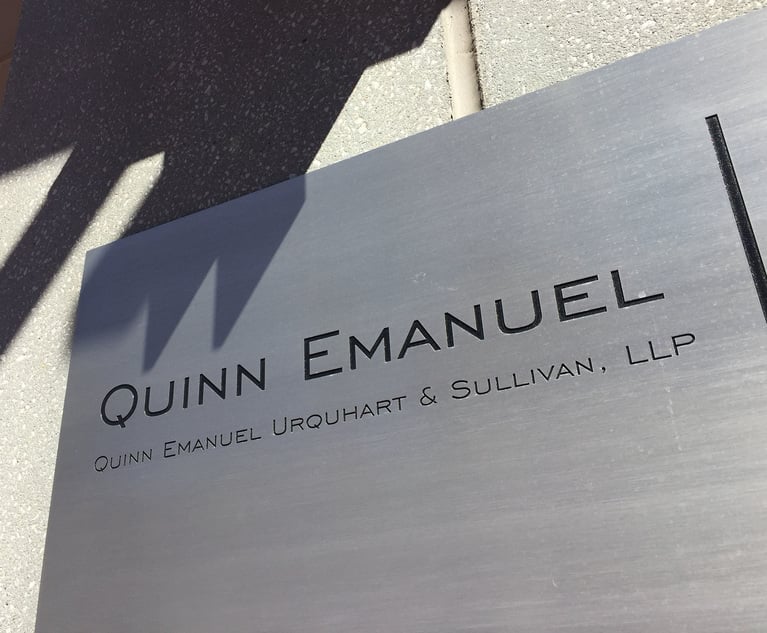Class-Action Objector Ted Frank Has Another 'Cy Pres' Challenge at SCOTUS
The justices last week avoided ruling on the merits of the controversial practice, but there's another case in the wings.
March 25, 2019 at 06:26 PM
6 minute read
 Ted Frank, Center for Class Action Fairness
Ted Frank, Center for Class Action Fairness
Before the end of the current term, the U.S. Supreme Court will get another chance to consider class action settlements in which all or nearly all the funds are paid to unrelated third parties and lawyers instead of to class members.
The justices last week avoided ruling on the merits of the controversial practice, known as “cy pres,” in the case Frank v. Gaos. The high court, in an unsigned opinion, sent that case, which involved an $8.5 settlement with Google, back to the U.S. Court of Appeals for the Ninth Circuit to determine whether the plaintiffs had suffered the required harm necessary to have standing to sue.
Ted Frank, director of litigation at the Hamilton Lincoln Law Institute, who argued pro se in Frank, has another cy pres petition teed up for the justices—one that he says lacks the problem that triggered the justices' decision last week to punt on the merits.
“There are no technical trip ups,” Frank said. “There will not be an Article III standing problem, a Spokeo (v. Robins) problem. This is a claim for money, a claim for fraud.”
The Google settlement was known as a cy pres-only agreement, where more than $5 million would be paid to six entities that are focused on internet privacy research, more than $2 million to class counsel, and no money to absent class members. With an estimated 129 million class members, the trial court found the settlement money was not distributable. A federal appeals court upheld that conclusion.
Justice Clarence Thomas last week dissented from the high court's opinion, writing: “Because the class members here received no settlement fund, no meaningful injunctive relief, and no other benefit whatsoever in exchange for the settlement of their claims, I would hold that the class action should not have been certified, and the settlement should not have been approved.”
There is some appetite at the court for reviewing cy pres cases. In 2013, Chief Justice John Roberts Jr. expressed his “fundamental concerns” with such settlements. The justices “may need to clarify the limits on the use of [cy pres],” which he said “are a growing feature” of class action settlements.
 U.S. Supreme Court Chief Justice John Roberts Jr. Photo: Diego M. Radzinschi/ALM
U.S. Supreme Court Chief Justice John Roberts Jr. Photo: Diego M. Radzinschi/ALMFrank's new challenge does not involve a cy pres-only settlement but, he said, “it's just as abusive.”
The case, Perryman v. Romero, stems from a lawsuit alleging Provide Commerce Inc. and Regent Group Inc. unlawfully enrolled 1.3 million online consumers in a rewards program without their consent and then charged them a monthly membership fee after they accepted a $15 “thank you” gift.
The settlement created a $12.5 million cash fund. Class counsel sought $8.65 million in fees and $200,000 in costs from the fund. Class representatives would receive $80,000 in awards from the fund. Each class member would received a $20 “e-credit” for use on Provide Commerce's websites. The remaining funds would be used for refunds.
Only 3,000 class members sought refunds for total of $225,000, leaving about $3 million for cy pres awards to three San Diego-area universities, including the University of San Diego School of Law, alma mater to several of the attorneys in the case.
Washington attorney Brian Perryman, a class member, objected to the settlement, which called for a cy pres award even though every class member was known and would receive the e-credit. He also challenged the award to the three San Diego schools, which were local even though, he argued, the class was nationwide.
The Ninth Circuit affirmed the cy pres award, acknowledging “it might be technically feasible” to distribute the amount to the non-claimant class members, but such a distribution would be “de minimis” because there were more than a million members. The awards would run from between $2.50 and $7. The court vacated the attorney fee award, which is being recalculated in the district court.
In the Google high court case, Frank had urged the justices to hear Perryman if they failed to reach the merits of the settlement involving Google.
“The circuit split is still there,” Frank said. “They granted cert on it before and the Ninth Circuit is still signing off on some really appalling cy pres settlements.”
Jennie Anderson of San Francisco's Andrus Anderson, represents Josue Romero and other class members. She did not respond to a request for comment. The high court has given her until April 17 to file a brief in opposition. Provide Commerce was represented in the Ninth Circuit by Leo Norton of Cooley.
Sixteen state attorneys general, led by Arizona solicitor general Oramel Skinner, have filed an amicus brief supporting Frank's petition.
The Center for Individual Rights, with Michael Rosman as counsel, also is a supporting amicus. Rosman raises a First Amendment issue with cy pres awards. Relying on the high court's union fee decision—Janus v. AFSCME, Rosman tells the court that cy pres funds “may then be used to engage in speech or political activity with which class members may very well disagree, in violation of their First Amendment rights.”
Jonah Knobler, partner in Patterson Belknap Webb & Tyler, said the oral arguments in Frank's Google case suggested that cy pres-only settlements were not likely to survive.
“We could only guess how Justice Thomas felt about them, however, since he did not speak,” Knobler said. “With Thomas' dissent, it is even more likely that, once the court finally reaches the issue, it will significantly limit the use of cy pres.”
Read more:
Justices Punt on Google 'Cy Pres' Settlement Amid Standing Questions
Supreme Court Frowns on Cy Pres Settlements, but Fate Is Uncertain
DOJ Tells Court: Class Lawyers Already Got $60M in Fees. They Want More?
This content has been archived. It is available through our partners, LexisNexis® and Bloomberg Law.
To view this content, please continue to their sites.
Not a Lexis Subscriber?
Subscribe Now
Not a Bloomberg Law Subscriber?
Subscribe Now
NOT FOR REPRINT
© 2025 ALM Global, LLC, All Rights Reserved. Request academic re-use from www.copyright.com. All other uses, submit a request to [email protected]. For more information visit Asset & Logo Licensing.
You Might Like
View All
Private Equity Giant KKR Refiles SDNY Countersuit in DOJ Premerger Filing Row
3 minute read
Skadden and Steptoe, Defending Amex GBT, Blasts Biden DOJ's Antitrust Lawsuit Over Merger Proposal
4 minute read
Quinn Emanuel Files Countersuit Against DOJ in Row Over Premerger Reporting
3 minute read
Read the Document: DOJ Releases Ex-Special Counsel's Report Explaining Trump Prosecutions
3 minute readTrending Stories
- 1Silk Road Founder Ross Ulbricht Has New York Sentence Commuted by Trump
- 2Settlement Allows Spouses of U.S. Citizens to Reopen Removal Proceedings
- 3CFPB Resolves Flurry of Enforcement Actions in Biden's Final Week
- 4Judge Orders SoCal Edison to Preserve Evidence Relating to Los Angeles Wildfires
- 5Legal Community Luminaries Honored at New York State Bar Association’s Annual Meeting
Who Got The Work
J. Brugh Lower of Gibbons has entered an appearance for industrial equipment supplier Devco Corporation in a pending trademark infringement lawsuit. The suit, accusing the defendant of selling knock-off Graco products, was filed Dec. 18 in New Jersey District Court by Rivkin Radler on behalf of Graco Inc. and Graco Minnesota. The case, assigned to U.S. District Judge Zahid N. Quraishi, is 3:24-cv-11294, Graco Inc. et al v. Devco Corporation.
Who Got The Work
Rebecca Maller-Stein and Kent A. Yalowitz of Arnold & Porter Kaye Scholer have entered their appearances for Hanaco Venture Capital and its executives, Lior Prosor and David Frankel, in a pending securities lawsuit. The action, filed on Dec. 24 in New York Southern District Court by Zell, Aron & Co. on behalf of Goldeneye Advisors, accuses the defendants of negligently and fraudulently managing the plaintiff's $1 million investment. The case, assigned to U.S. District Judge Vernon S. Broderick, is 1:24-cv-09918, Goldeneye Advisors, LLC v. Hanaco Venture Capital, Ltd. et al.
Who Got The Work
Attorneys from A&O Shearman has stepped in as defense counsel for Toronto-Dominion Bank and other defendants in a pending securities class action. The suit, filed Dec. 11 in New York Southern District Court by Bleichmar Fonti & Auld, accuses the defendants of concealing the bank's 'pervasive' deficiencies in regards to its compliance with the Bank Secrecy Act and the quality of its anti-money laundering controls. The case, assigned to U.S. District Judge Arun Subramanian, is 1:24-cv-09445, Gonzalez v. The Toronto-Dominion Bank et al.
Who Got The Work
Crown Castle International, a Pennsylvania company providing shared communications infrastructure, has turned to Luke D. Wolf of Gordon Rees Scully Mansukhani to fend off a pending breach-of-contract lawsuit. The court action, filed Nov. 25 in Michigan Eastern District Court by Hooper Hathaway PC on behalf of The Town Residences LLC, accuses Crown Castle of failing to transfer approximately $30,000 in utility payments from T-Mobile in breach of a roof-top lease and assignment agreement. The case, assigned to U.S. District Judge Susan K. Declercq, is 2:24-cv-13131, The Town Residences LLC v. T-Mobile US, Inc. et al.
Who Got The Work
Wilfred P. Coronato and Daniel M. Schwartz of McCarter & English have stepped in as defense counsel to Electrolux Home Products Inc. in a pending product liability lawsuit. The court action, filed Nov. 26 in New York Eastern District Court by Poulos Lopiccolo PC and Nagel Rice LLP on behalf of David Stern, alleges that the defendant's refrigerators’ drawers and shelving repeatedly break and fall apart within months after purchase. The case, assigned to U.S. District Judge Joan M. Azrack, is 2:24-cv-08204, Stern v. Electrolux Home Products, Inc.
Featured Firms
Law Offices of Gary Martin Hays & Associates, P.C.
(470) 294-1674
Law Offices of Mark E. Salomone
(857) 444-6468
Smith & Hassler
(713) 739-1250










